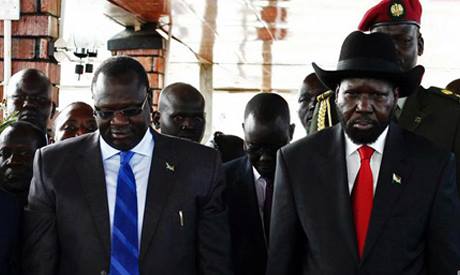South Sudan’s government refused to sign a peace deal with rebels Monday despite the threat of international sanctions, but will return to finalize an agreement within 15 days.
 South Sudan's government refused to sign a peace deal with rebels Monday despite the threat of international sanctions, but will return to finalize an agreement within 15 days, mediators said.
South Sudan's government refused to sign a peace deal with rebels Monday despite the threat of international sanctions, but will return to finalize an agreement within 15 days, mediators said.
Rebel chief Riek Machar however said he had signed a deal, and called on President Salva Kiir to join.
"It was an opportunity for us to end the war," Machar said.
"We call on President Kiir to reconsider his position so that they can sign and we can go forward," he added.
The secretary-general of the ruling party Pagan Amum also signed the deal, but mediators said he was not representing the government.
Kiir -- who watched the signing and briefly shook hands with Machar -- had warned from the start of talks it would not be possible to sign a credible peace deal because rebel forces have split.
Powerful rebel general Peter Gadet and other key commanders last week accused Machar of seeking power for himself, and said they would not recognize any deal agreed.
Kiir, who earlier said a "peace that cannot be sustained cannot be signed," left without comment after the meeting Monday.
Washington, which helped mediate the talks, expressed regret the president had not signed and urged him to do so.
"We call on the government to sign the agreement within the 15-day period it requested for consultations," State Department spokesman John Kirby said.
The international community had threatened possible sanctions if a deal was not reached by the end of the day, and it was not clear if the result of talks on Monday would ward off any repercussions.
South Sudan's civil war erupted in December 2013 when Kiir accused his former deputy Machar of planning a coup, setting off a cycle of retaliatory killings that has split the poverty-stricken, landlocked country along ethnic lines.
More than 70 percent of the country's 12 million people need aid, while 2.2 million people have fled their homes, the UN says, with areas on the brink of famine.